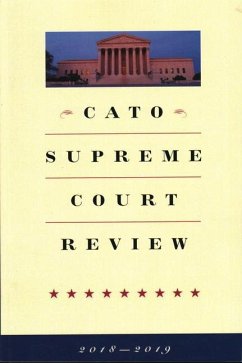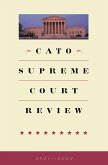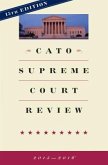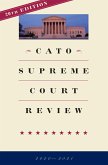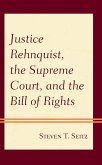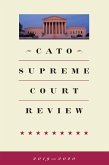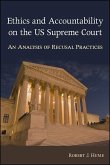Cato Supreme Court Review
2018-2019
Herausgeber: Shapiro, Ilya
14,99 €
inkl. MwSt.
Versandfertig in über 4 Wochen

7 °P sammeln
Cato Supreme Court Review
2018-2019
Herausgeber: Shapiro, Ilya
- Broschiertes Buch
- Merkliste
- Auf die Merkliste
- Bewerten Bewerten
- Teilen
- Produkt teilen
- Produkterinnerung
- Produkterinnerung
In this annual review from the Cato Institute, Ilya Shapiro and leading legal scholars analyze the 2018-2019 Supreme Court term, specifically the most important and far-reaching cases of the year, plus cases coming up. Now in its eighteenth edition, the Review is the first scholarly journal to appear after the term's end and the only one grounded in the nation's first principles, liberty, and limited government.
Andere Kunden interessierten sich auch für
![Cato Supreme Court Review 2021-2022 Cato Supreme Court Review 2021-2022]() Cato Supreme Court Review 2021-202214,99 €
Cato Supreme Court Review 2021-202214,99 €![Cato Supreme Court Review Cato Supreme Court Review]() Cato Supreme Court Review14,99 €
Cato Supreme Court Review14,99 €![Cato Supreme Court Review: 2020-2021 Cato Supreme Court Review: 2020-2021]() Cato Supreme Court Review: 2020-202114,99 €
Cato Supreme Court Review: 2020-202114,99 €![Justice Rehnquist, the Supreme Court, and the Bill of Rights Justice Rehnquist, the Supreme Court, and the Bill of Rights]() Steven T SeitzJustice Rehnquist, the Supreme Court, and the Bill of Rights50,99 €
Steven T SeitzJustice Rehnquist, the Supreme Court, and the Bill of Rights50,99 €![Cato Supreme Court Review: 2019-2020 Cato Supreme Court Review: 2019-2020]() Cato Supreme Court Review: 2019-202014,99 €
Cato Supreme Court Review: 2019-202014,99 €![Ethics and Accountability on the Us Supreme Court Ethics and Accountability on the Us Supreme Court]() Robert J HumeEthics and Accountability on the Us Supreme Court40,99 €
Robert J HumeEthics and Accountability on the Us Supreme Court40,99 €![Nine Black Robes Nine Black Robes]() Joan BiskupicNine Black Robes21,99 €
Joan BiskupicNine Black Robes21,99 €-
-
-
In this annual review from the Cato Institute, Ilya Shapiro and leading legal scholars analyze the 2018-2019 Supreme Court term, specifically the most important and far-reaching cases of the year, plus cases coming up. Now in its eighteenth edition, the Review is the first scholarly journal to appear after the term's end and the only one grounded in the nation's first principles, liberty, and limited government.
Hinweis: Dieser Artikel kann nur an eine deutsche Lieferadresse ausgeliefert werden.
Hinweis: Dieser Artikel kann nur an eine deutsche Lieferadresse ausgeliefert werden.
Produktdetails
- Produktdetails
- Verlag: Cato Institute
- 18th edition
- Seitenzahl: 250
- Erscheinungstermin: 7. Oktober 2019
- Englisch
- Abmessung: 226mm x 150mm x 23mm
- Gewicht: 431g
- ISBN-13: 9781948647564
- ISBN-10: 1948647567
- Artikelnr.: 58036864
- Herstellerkennzeichnung
- Libri GmbH
- Europaallee 1
- 36244 Bad Hersfeld
- 06621 890
- Verlag: Cato Institute
- 18th edition
- Seitenzahl: 250
- Erscheinungstermin: 7. Oktober 2019
- Englisch
- Abmessung: 226mm x 150mm x 23mm
- Gewicht: 431g
- ISBN-13: 9781948647564
- ISBN-10: 1948647567
- Artikelnr.: 58036864
- Herstellerkennzeichnung
- Libri GmbH
- Europaallee 1
- 36244 Bad Hersfeld
- 06621 890
Edited by Ilya Shapiro
FOREWORD - The Review's publisher examines how the Court, now with Justices
Kavanaugh and Gorsuch, is shaping up.
By Ilya Shapiro
AGENCY DEFERENCE - Kisor v. Wilkie - Many people thought the Court would
roll back the administrative state, but instead they tinkered with the
edges. Was this actually a big decision?
By Paul S. Larkin Jr.
CROSSES ON PUBLIC LAND - American Legion v. American Humanist Association
- The Court blocked an attack on a ceremonial cross on public land. Does
the decision signal an end to "cross wars" and other challenges to
religious symbols in public places?
By Michael McConnell
FIGHTING EMINENT DOMAIN - Knick v. Township of Scott, PA - Fighting eminent
domain became easier as the Court overturned a 34-year-old roadblock to
bringing challenges.
By Ilya Somin
LIQUOR LICENSING - Tennessee Wine & Spirits Retailers Association v. Thomas
- The 21st Amendment couldn't save Tennessee's residency requirement for
liquor licenses from being struck down under the Commerce Clause.
By Braden Boucek
CONGRESSIONAL DELEGATION - Gundy v. United States - This sleeper
blockbuster showed that the Court might be willing to revisit the question
of whether Congress delegates too much of its power to agencies.
By Gary S. Lawson
FIGHTING CIVIL FORFEITURE - Timbs v. Indiana - The Constitution's Excessive
Fines Clause now applies to the states, and it can also apply to civil
forfeitures, opening new avenues to challenge a commonly abused practice.
By Brianne J. Gorod and Brian R. Frazelle
DOUBLE JEOPARDY - Gamble v. United States - The Court declined to overturn
the "dual sovereign" exception to the Double Jeopardy Clause, which allows
both a state and the federal government to prosecute someone twice for the
same offense.
By Anthony J. Colangelo
ANTITRUST & APPLE - Apple Inc. v. Pepper - Does Apple have a monopoly on
apps? Can App Store purchasers sue even though they aren't direct
purchasers? The Court said yes, charting a new direction in antitrust law.
By Joshua D. Wright
Kavanaugh and Gorsuch, is shaping up.
By Ilya Shapiro
AGENCY DEFERENCE - Kisor v. Wilkie - Many people thought the Court would
roll back the administrative state, but instead they tinkered with the
edges. Was this actually a big decision?
By Paul S. Larkin Jr.
CROSSES ON PUBLIC LAND - American Legion v. American Humanist Association
- The Court blocked an attack on a ceremonial cross on public land. Does
the decision signal an end to "cross wars" and other challenges to
religious symbols in public places?
By Michael McConnell
FIGHTING EMINENT DOMAIN - Knick v. Township of Scott, PA - Fighting eminent
domain became easier as the Court overturned a 34-year-old roadblock to
bringing challenges.
By Ilya Somin
LIQUOR LICENSING - Tennessee Wine & Spirits Retailers Association v. Thomas
- The 21st Amendment couldn't save Tennessee's residency requirement for
liquor licenses from being struck down under the Commerce Clause.
By Braden Boucek
CONGRESSIONAL DELEGATION - Gundy v. United States - This sleeper
blockbuster showed that the Court might be willing to revisit the question
of whether Congress delegates too much of its power to agencies.
By Gary S. Lawson
FIGHTING CIVIL FORFEITURE - Timbs v. Indiana - The Constitution's Excessive
Fines Clause now applies to the states, and it can also apply to civil
forfeitures, opening new avenues to challenge a commonly abused practice.
By Brianne J. Gorod and Brian R. Frazelle
DOUBLE JEOPARDY - Gamble v. United States - The Court declined to overturn
the "dual sovereign" exception to the Double Jeopardy Clause, which allows
both a state and the federal government to prosecute someone twice for the
same offense.
By Anthony J. Colangelo
ANTITRUST & APPLE - Apple Inc. v. Pepper - Does Apple have a monopoly on
apps? Can App Store purchasers sue even though they aren't direct
purchasers? The Court said yes, charting a new direction in antitrust law.
By Joshua D. Wright
FOREWORD - The Review's publisher examines how the Court, now with Justices
Kavanaugh and Gorsuch, is shaping up.
By Ilya Shapiro
AGENCY DEFERENCE - Kisor v. Wilkie - Many people thought the Court would
roll back the administrative state, but instead they tinkered with the
edges. Was this actually a big decision?
By Paul S. Larkin Jr.
CROSSES ON PUBLIC LAND - American Legion v. American Humanist Association
- The Court blocked an attack on a ceremonial cross on public land. Does
the decision signal an end to "cross wars" and other challenges to
religious symbols in public places?
By Michael McConnell
FIGHTING EMINENT DOMAIN - Knick v. Township of Scott, PA - Fighting eminent
domain became easier as the Court overturned a 34-year-old roadblock to
bringing challenges.
By Ilya Somin
LIQUOR LICENSING - Tennessee Wine & Spirits Retailers Association v. Thomas
- The 21st Amendment couldn't save Tennessee's residency requirement for
liquor licenses from being struck down under the Commerce Clause.
By Braden Boucek
CONGRESSIONAL DELEGATION - Gundy v. United States - This sleeper
blockbuster showed that the Court might be willing to revisit the question
of whether Congress delegates too much of its power to agencies.
By Gary S. Lawson
FIGHTING CIVIL FORFEITURE - Timbs v. Indiana - The Constitution's Excessive
Fines Clause now applies to the states, and it can also apply to civil
forfeitures, opening new avenues to challenge a commonly abused practice.
By Brianne J. Gorod and Brian R. Frazelle
DOUBLE JEOPARDY - Gamble v. United States - The Court declined to overturn
the "dual sovereign" exception to the Double Jeopardy Clause, which allows
both a state and the federal government to prosecute someone twice for the
same offense.
By Anthony J. Colangelo
ANTITRUST & APPLE - Apple Inc. v. Pepper - Does Apple have a monopoly on
apps? Can App Store purchasers sue even though they aren't direct
purchasers? The Court said yes, charting a new direction in antitrust law.
By Joshua D. Wright
Kavanaugh and Gorsuch, is shaping up.
By Ilya Shapiro
AGENCY DEFERENCE - Kisor v. Wilkie - Many people thought the Court would
roll back the administrative state, but instead they tinkered with the
edges. Was this actually a big decision?
By Paul S. Larkin Jr.
CROSSES ON PUBLIC LAND - American Legion v. American Humanist Association
- The Court blocked an attack on a ceremonial cross on public land. Does
the decision signal an end to "cross wars" and other challenges to
religious symbols in public places?
By Michael McConnell
FIGHTING EMINENT DOMAIN - Knick v. Township of Scott, PA - Fighting eminent
domain became easier as the Court overturned a 34-year-old roadblock to
bringing challenges.
By Ilya Somin
LIQUOR LICENSING - Tennessee Wine & Spirits Retailers Association v. Thomas
- The 21st Amendment couldn't save Tennessee's residency requirement for
liquor licenses from being struck down under the Commerce Clause.
By Braden Boucek
CONGRESSIONAL DELEGATION - Gundy v. United States - This sleeper
blockbuster showed that the Court might be willing to revisit the question
of whether Congress delegates too much of its power to agencies.
By Gary S. Lawson
FIGHTING CIVIL FORFEITURE - Timbs v. Indiana - The Constitution's Excessive
Fines Clause now applies to the states, and it can also apply to civil
forfeitures, opening new avenues to challenge a commonly abused practice.
By Brianne J. Gorod and Brian R. Frazelle
DOUBLE JEOPARDY - Gamble v. United States - The Court declined to overturn
the "dual sovereign" exception to the Double Jeopardy Clause, which allows
both a state and the federal government to prosecute someone twice for the
same offense.
By Anthony J. Colangelo
ANTITRUST & APPLE - Apple Inc. v. Pepper - Does Apple have a monopoly on
apps? Can App Store purchasers sue even though they aren't direct
purchasers? The Court said yes, charting a new direction in antitrust law.
By Joshua D. Wright
